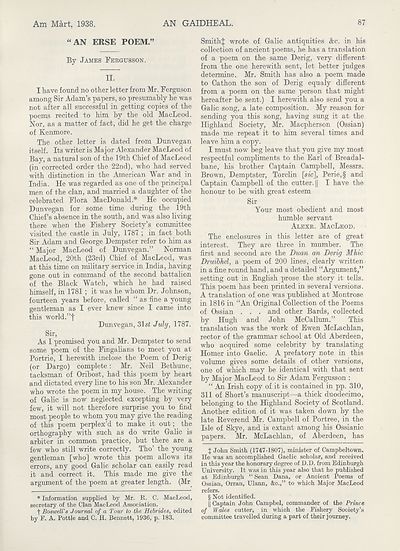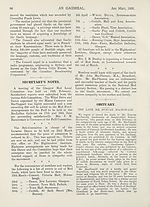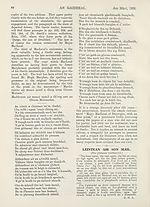An Comunn Gàidhealach Publications > Gaidheal > Volume 33, October 1937--September 1938
(95) Page 87
Download files
Complete book:
Individual page:
Thumbnail gallery: Grid view | List view

Am Mart, 1938.
AN GAIDHEAL.
87
“AN ERSE POEM.”
By James Fergusson.
II.
I have found no other letter from Mr. Ferguson
among Sir Adam’s papers, so presumably he was
not after all successful in getting copies of the
poems recited to him by the old MacLeod.
Nor, as a matter of fact, did he get the charge
of Kenmore.
The other letter is dated from Dunvegan
itself. Its writer is Major Alexander MacLeod of
Bay, a natural son of the 19th Chief of MacLeod
(in corrected order the 22nd), who had served
with distinction in the American War and in
India. He was regarded as one of the principal
men of the clan, and married a daughter of the
celebrated Flora MacDonald* He occupied
Dunvegan for some time during the 19th
Chief’s absence in the south, and was also living
there when the Fishery Society’s committee
visited the castle in July, 1787 ; in fact both
Sir Adam and George Dempster refer to him as
“ Major MacLeod of Dunvegan.” Norman
MacLeod, 20th (23rd) Chief of MacLeod, was
at this time on military service in India, having
gone out in command of the second battalion
of the Black Watch, which he had raised
himself, in 1781 ; it was he whom Dr. Johnson,
fourteen years before, called “ as fine a young
gentleman as I ever knew since I came into
this World.”t
Dunvegan, 31sf July, 1787.
Sir,
As I promised you and Mr. Dempster to send
some poem of the Fingalians to meet you at
Portrie, I herewith inclose the Poem of Derig
(or Dargo) complete: Mr. Neil Bethune,
tacksman of Oribost, had this poem by heart
and dictated every line to his son Mr. Alexander
who wrote the poem in my house. The writing
of Galic is now neglected excepting by very
few, it will not therefore surprise you to find
most people to whom you may give the reading
of this poem perplex’d to make it out; the
orthography with such as do write Galic is
arbiter in common practice, but there are a
few who still write correctly. Tho’ the young
gentleman [who] wrote this poem allows its
errors, any good Galic scholar can easily read
it and correct it. This made me give the
argument of the poem at greater length. (Mr
* Information supplied by Mr. R. C. MacLeod,
secretary of the Clan MacLeod Association.
f Boswell’s Journal of a Tour to the Hebrides, edited
by F. A. Pottle and C. JL Bennett, 1936, p. 183.
SmithJ wrote of Galic antiquities &c. in his
collection of ancient poems, he has a translation
of a poem on the same Derig, very different
from the one herewith sent, let better judges
determine. Mr. Smith has also a poem made
to Cathon the son of Derig equaly different
from a poem on the same person that might
hereafter be sent.) I herewith also send you a
Galic song, a late composition. My reason for
sending you this song, having sung it at the
Highland Society, Mr. Macpherson (Ossian)
made me repeat it to him several times and
leave him a copy.
I must now beg leave that you give my most
respectful compliments to the Earl of Breadal-
bane, his brother Captain Campbell, Messrs.
Brown, Demptster, Torclin [sic], Perie,§ and
Captain Campbell of the cutter. || I have the
honour to be with great esteem
Sir
Your most obedient and most
humble servant
Alexr. MacLeod.
The enclosures in this letter are of great
interest. They are three in mumber. The
first and second are the Duan an Derig Mhic
Druibhel, a poem of 200 lines, clearly written
in a fine round hand, and a detailed “Argument,”
setting out in English prose the story it tells.
This poem has been printed in several versions.
A translation of one was published at Montrose
in 1816 in “An Original Collection of the Poems
of Ossian . . . and other Bards, collected
by Hugh and John McCallum.” This
translation was the work of Ewen McLachlan,
rector of the grammar school at Old Aberdeen,
who acquired some celebrity by translating
Homer into Gaelic. A prefatory note in this
volume gives some details of other versions,
one of which may be identical with that sent
by Major MacLeod to Sir Adam Fergusson :
“ An Irish copy of it is contained in pp. 310,
311 of Short’s manuscript—a thick duodecimo,
belonging to the Highland Society of Scotland.
Another edition of it was taken down by the
late Reverend Mr. Campbell of Portree, in the
Isle of Skye, and is extant among his Ossianic
papers. Mr. McLachlan, of Aberdeen, has
J John Smith (1747-1807), minister of Campbeltown.
He was an accomplished Gaelic scholar, and received
in this year the honorary degree of D.D. from Edinburgh
University. It was in this year also that he published
at Edinburgh “ Sean Dana, or Ancient Poems of
Ossian, Orran, Ulann, &c.,” to which Major MacLeod
refers.
§ Not identified.
|| Captain John Campbel, commander of the Prince
of Wales cutter, in which the Fishery Society’s
committee travelled during a part of their journey.
AN GAIDHEAL.
87
“AN ERSE POEM.”
By James Fergusson.
II.
I have found no other letter from Mr. Ferguson
among Sir Adam’s papers, so presumably he was
not after all successful in getting copies of the
poems recited to him by the old MacLeod.
Nor, as a matter of fact, did he get the charge
of Kenmore.
The other letter is dated from Dunvegan
itself. Its writer is Major Alexander MacLeod of
Bay, a natural son of the 19th Chief of MacLeod
(in corrected order the 22nd), who had served
with distinction in the American War and in
India. He was regarded as one of the principal
men of the clan, and married a daughter of the
celebrated Flora MacDonald* He occupied
Dunvegan for some time during the 19th
Chief’s absence in the south, and was also living
there when the Fishery Society’s committee
visited the castle in July, 1787 ; in fact both
Sir Adam and George Dempster refer to him as
“ Major MacLeod of Dunvegan.” Norman
MacLeod, 20th (23rd) Chief of MacLeod, was
at this time on military service in India, having
gone out in command of the second battalion
of the Black Watch, which he had raised
himself, in 1781 ; it was he whom Dr. Johnson,
fourteen years before, called “ as fine a young
gentleman as I ever knew since I came into
this World.”t
Dunvegan, 31sf July, 1787.
Sir,
As I promised you and Mr. Dempster to send
some poem of the Fingalians to meet you at
Portrie, I herewith inclose the Poem of Derig
(or Dargo) complete: Mr. Neil Bethune,
tacksman of Oribost, had this poem by heart
and dictated every line to his son Mr. Alexander
who wrote the poem in my house. The writing
of Galic is now neglected excepting by very
few, it will not therefore surprise you to find
most people to whom you may give the reading
of this poem perplex’d to make it out; the
orthography with such as do write Galic is
arbiter in common practice, but there are a
few who still write correctly. Tho’ the young
gentleman [who] wrote this poem allows its
errors, any good Galic scholar can easily read
it and correct it. This made me give the
argument of the poem at greater length. (Mr
* Information supplied by Mr. R. C. MacLeod,
secretary of the Clan MacLeod Association.
f Boswell’s Journal of a Tour to the Hebrides, edited
by F. A. Pottle and C. JL Bennett, 1936, p. 183.
SmithJ wrote of Galic antiquities &c. in his
collection of ancient poems, he has a translation
of a poem on the same Derig, very different
from the one herewith sent, let better judges
determine. Mr. Smith has also a poem made
to Cathon the son of Derig equaly different
from a poem on the same person that might
hereafter be sent.) I herewith also send you a
Galic song, a late composition. My reason for
sending you this song, having sung it at the
Highland Society, Mr. Macpherson (Ossian)
made me repeat it to him several times and
leave him a copy.
I must now beg leave that you give my most
respectful compliments to the Earl of Breadal-
bane, his brother Captain Campbell, Messrs.
Brown, Demptster, Torclin [sic], Perie,§ and
Captain Campbell of the cutter. || I have the
honour to be with great esteem
Sir
Your most obedient and most
humble servant
Alexr. MacLeod.
The enclosures in this letter are of great
interest. They are three in mumber. The
first and second are the Duan an Derig Mhic
Druibhel, a poem of 200 lines, clearly written
in a fine round hand, and a detailed “Argument,”
setting out in English prose the story it tells.
This poem has been printed in several versions.
A translation of one was published at Montrose
in 1816 in “An Original Collection of the Poems
of Ossian . . . and other Bards, collected
by Hugh and John McCallum.” This
translation was the work of Ewen McLachlan,
rector of the grammar school at Old Aberdeen,
who acquired some celebrity by translating
Homer into Gaelic. A prefatory note in this
volume gives some details of other versions,
one of which may be identical with that sent
by Major MacLeod to Sir Adam Fergusson :
“ An Irish copy of it is contained in pp. 310,
311 of Short’s manuscript—a thick duodecimo,
belonging to the Highland Society of Scotland.
Another edition of it was taken down by the
late Reverend Mr. Campbell of Portree, in the
Isle of Skye, and is extant among his Ossianic
papers. Mr. McLachlan, of Aberdeen, has
J John Smith (1747-1807), minister of Campbeltown.
He was an accomplished Gaelic scholar, and received
in this year the honorary degree of D.D. from Edinburgh
University. It was in this year also that he published
at Edinburgh “ Sean Dana, or Ancient Poems of
Ossian, Orran, Ulann, &c.,” to which Major MacLeod
refers.
§ Not identified.
|| Captain John Campbel, commander of the Prince
of Wales cutter, in which the Fishery Society’s
committee travelled during a part of their journey.
Set display mode to:
![]() Universal Viewer |
Universal Viewer | ![]() Mirador |
Large image | Transcription
Mirador |
Large image | Transcription
| An Comunn Gàidhealach > An Comunn Gàidhealach Publications > Gaidheal > Volume 33, October 1937--September 1938 > (95) Page 87 |
|---|
| Permanent URL | https://digital.nls.uk/125256684 |
|---|
| Description | This contains items published by An Comunn, which are not specifically Mòd-related. It includes journals, annual reports and corporate documents, policy statements, educational resources and published plays and literature. It is arranged alphabetically by title. |
|---|
| Description | A collection of over 400 items published by An Comunn Gàidhealach, the organisation which promotes Gaelic language and culture and organises the Royal National Mòd. Dating from 1891 up to the present day, the collection includes journals and newspapers, annual reports, educational materials, national Mòd programmes, published Mòd literature and music. |
|---|---|
| Additional NLS resources: |
|

